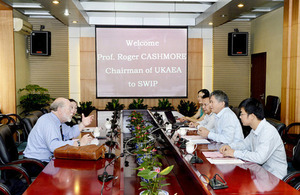Chairman's nuclear tour of the Far East
Chairman Roger Cashmore has been flying the flag for UK fusion research in his recent tour of the Far East.

Chairman's visit to China
Roger Cashmore’s three-week schedule of the Far East took in no less than five research institutes and two energy conferences, as well as a series of meetings with fusion and fission experts in China and Japan.
The UK Atomic Energy Authority recently signed Memoranda of Understanding with four Chinese research institutes, and Professor Cashmore travelled to the cities of Chengdu and Hefei to see the projects at each of them, talk to senior scientists and give lectures on the status of UK fusion research.
Professor Cashmore met with the UK Energy and Climate Change Secretary, Ed Davey, in Beijing, to discuss progress in fusion, as well as discussing other areas of nuclear technology in which the UK Atomic Energy Authority has an interest. Ed Davey was at the UK-China Energy Dialogue meeting to sign agreements between the two countries on wind power, ahead of the announcement of Chinese investment in Britain’s new nuclear power stations.
The Chairman’s next port of call was the Low Carbon Earth Summit in Xi’an – a chance to remind delegates from around the world of the part fusion and fission can play in reducing dependence on fossil fuels.
Then it was off to Japan for an update on the JT60SA tokamak construction project at Naka, part of the Broader Approach agreement between Europe and Japan on fusion research. While in Japan Professor Cashmore also attended meetings with those working on the clean-up of Fukushima. Having chaired the Royal Society’s working group on nuclear technology, he was able to offer his analysis on the current plans to deal with the stricken reactors.
“It was an exhausting but worthwhile trip,” he said. “It makes sense to increase our collaborations with researchers in both nations, and I was able to see what they’re working on and how we can co-operate more closely. I also welcomed the opportunity to bring the input of the fusion community to the more general nuclear debate.”